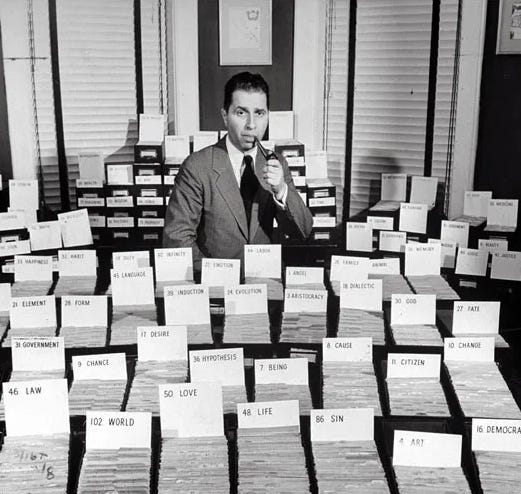Intro to the Great Conversation
The Great Conversation is the brief introductory volume to The Great Books of the Western World, by the series' executive editor, Robert M. Hutchins. Although the Great Books series has a bad name nowadays, in an age when it's believed to be a last hold-out of the dead-white-European-male canon tradition, its authors had high hopes for its potential to improve regular people's understanding of the culture they had inherited. Hutchins began his Introduction by saying, "It is the task of every generation to reassess the tradition in which it lives, to discard what it cannot use, and to bring into context with the distant and intermediate past the most recent contributions to the Great Conversation." On the very first page, Hutchins (the president of the University of Chicago) wasn't telling regular people they had to shut up and appreciate the classics in the way the experts prescribe. He was asking them to participate in "an attempt to reappraise and re-embody the tradition of the West for our generation."
Writing in the early 1950s (The Great Books came out in 1952), Hutchins seemed well aware of what was at stake. "We are as concerned as anybody else," he said, "at the headlong plunge into the abyss that Western civilization seems to be taking." But the point of understanding the tradition was not to try to step back into the past and live in a simpler or better time. Hutchins said, "We are quite aware that we do not live in any time but the present, and, distressing as the present is, we would not care to live in any other time if we could. We want the voices of the Great Conversation to be heard again because we think they may help us to learn to live better now."
The problems of the present, Hutchins believed (and even more of our present, seventy years later) were partly the result of people losing the ability to understand this tradition. Not because it is the best of all possible worlds, but precisely because it is so complex and fallible. The alternative to a complex understanding of the world is propaganda. Hutchins warned, "We believe that the reduction of the citizen to an object of propaganda, public and private, is one of the greatest dangers to democracy." He continued, in words that could have been written last week, "The reiteration of slogans, the distortion of the news, the great storm of propaganda that beats upon the citizen twenty-four hours a day all his life long mean either that democracy must fall prey to the loudest and most persistent propagandists or that the people must save themselves by strengthening their minds so that they can appraise the issues for themselves." (my emphasis)
Hutchins did not claim that reading the Great Books is a complete antidote to the decline of Western civilization or an easy way to safeguard democracy. But it's a start: 443 works by 74 authors, all but three published complete rather than as excerpts. With no expert guidance. Hutchins said, "The Advisory Board recommended that no scholarly apparatus should be included in the set...The books should speak for themselves and the reader should decide for himself." The set did, however, include The Syntopicon, "which began as an index and then turned into a means of helping the reader find paths through the books." This occupies nearly 2,500 pages in the next two volumes of the Great Books series. In January 1948 (four years before the Great Books came out!), Life ran an article called "The 102 Great Ideas" featuring photos of Mortimer Adler and his team along with the hundreds of thousands of note cards they used to compile and cross-reference the thousands of ideas contained in the 102 categories (gratitude to Chris Aldrich for pointing it out!). I'll talk about the Life article in a separate post soon. As a preview, its authors remarked on the fact that one of the 102 great ideas was "Man", but that "Woman" was omitted.
The ten chapters of this short (131 page) volume described the conversation and its importance. I'll cover them in a subsequent post as well. I thought it would be useful to begin with this introduction, since its point seems to be very much like mine in beginning Lifelong Learners.


